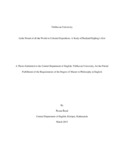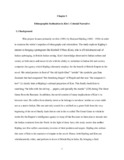Please use this identifier to cite or link to this item:
https://elibrary.tucl.edu.np/handle/123456789/3185Full metadata record
| DC Field | Value | Language |
|---|---|---|
| dc.contributor.author | Baral, Pawan | |
| dc.date.accessioned | 2021-04-02T05:43:10Z | |
| dc.date.accessioned | 2021-07-23T04:28:08Z | - |
| dc.date.available | 2021-04-02T05:43:10Z | |
| dc.date.available | 2021-07-23T04:28:08Z | - |
| dc.date.issued | 2015 | |
| dc.identifier.uri | http://elibrary.tucl.edu.np/handle/123456789/3185 | - |
| dc.description.abstract | This study attempts to explore how Kipling simultaneously works in documenting Indian cultural landscape from the domineering vantage point of colonialism in Kim. This For that purpose, it uses the concepts of anthropologists such as Martyn Hammersley, Paul Atkinson, Dwight Conquergood , Peter Pels , Kirsty Williamson etc., and Kim’s critics like Edward Said, Don Randall, Phillip E. Wegner, Mehmet Ali Çelikel etc. It analyzes how Kipling operates in extracting and documenting cultural data from the field and how he creates imperialistic picture of Indian customs and manners due to his colonial outlook in documentation. He utilizes Kim and the Lama to explore Indian cultural landscape by putting them in a grand colonial expedition in the back drop of The Great Game. Leading them through many cultural settings, they become the means for the writer to explore rich cultural heritage of India. In the mean time Kipling, through his technically omniscient Anglo-Indian narrator, adds imperialistic color and glamour in his observation and recording of cultural information. This is especially obvious in the narrator’s derogatory remarks on Orientals and Asians in generalizing terms. In this sense, the study claims this text to sense ethnography cum colonialist writing though not in their purest sense. The thesis has been divided into four chapters. The first states the hypothesis, introduces ethnography, colonialism, shows the link between ethnography and colonialism and presents the crux of the study. The second situates ethnography in the text. The third practically analyzes how colonial and ethnographic drives of the writer operate together in the text. The last restates the arguments made in the hypothesis that the text evidences the writerly impulses of ethnography and colonialism. | en_US |
| dc.language.iso | en_US | en_US |
| dc.publisher | Central Department of English | en_US |
| dc.subject | English Literature | en_US |
| dc.subject | Philosophy | en_US |
| dc.subject | Study | en_US |
| dc.title | Little Friend of all the World in Colonial Expedition: A Study of Rudyard Kipling’s Kim | en_US |
| dc.type | Thesis | en_US |
| Appears in Collections: | English | |
Files in This Item:
| File | Description | Size | Format | |
|---|---|---|---|---|
| Cover Page-12.pdf | 403.06 kB | Adobe PDF |  View/Open | |
| Chapter I.pdf | 797.53 kB | Adobe PDF |  View/Open |
Items in DSpace are protected by copyright, with all rights reserved, unless otherwise indicated.
